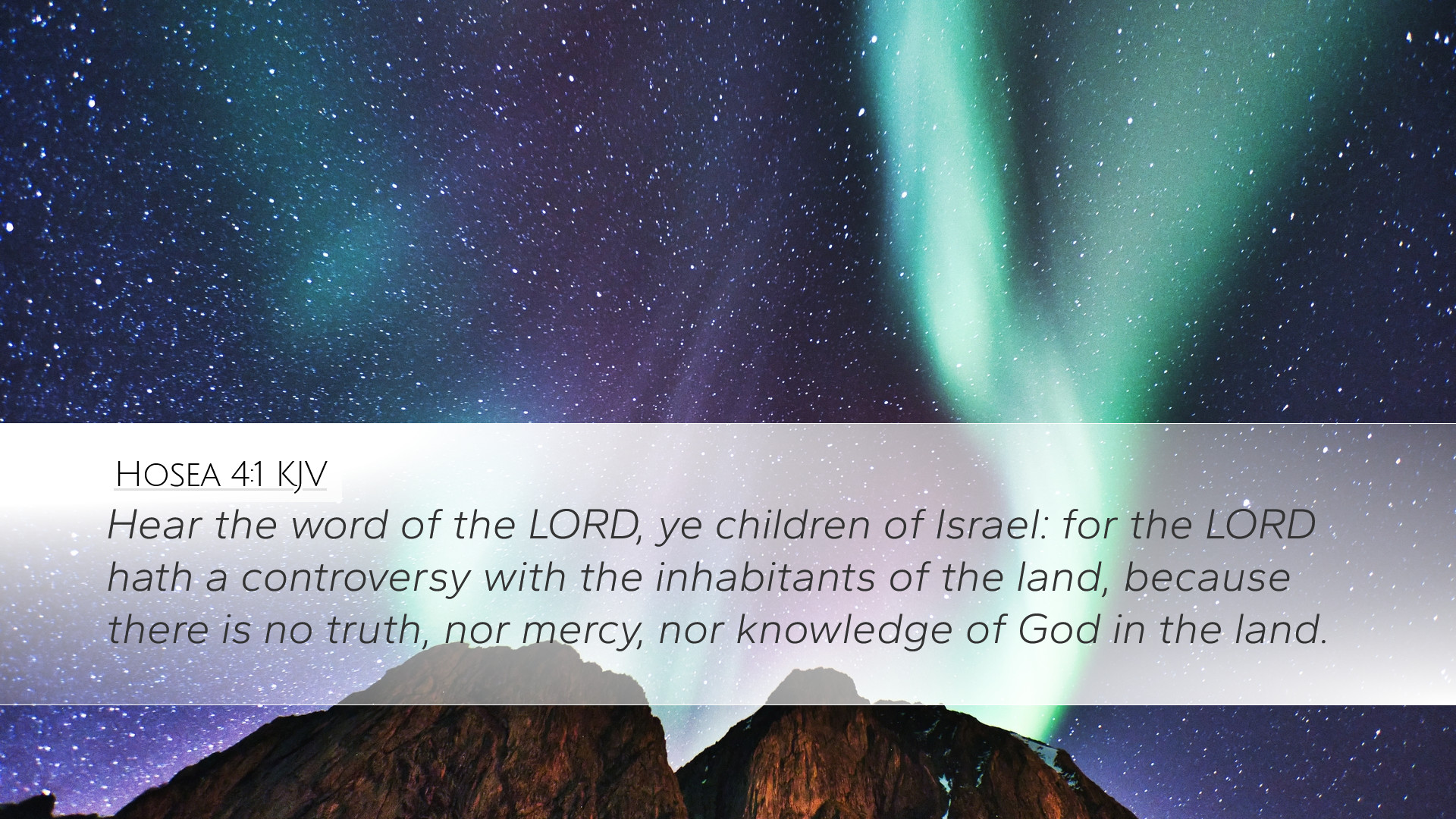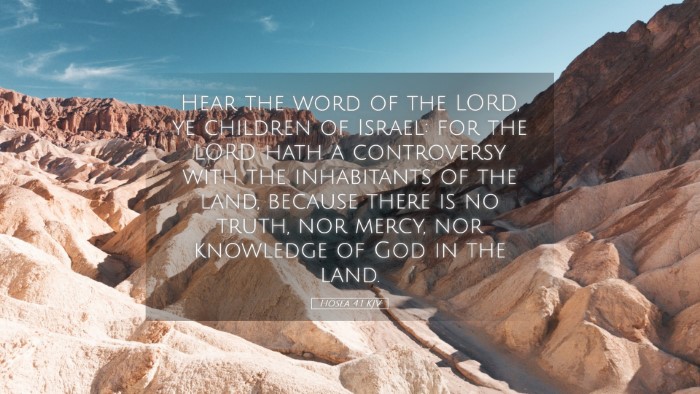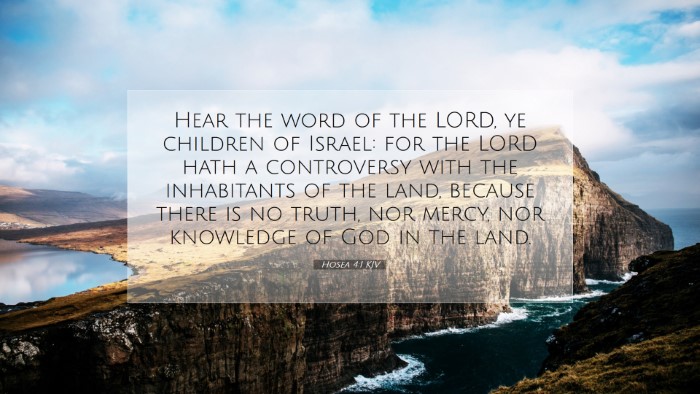Old Testament
Genesis Exodus Leviticus Numbers Deuteronomy Joshua Judges Ruth 1 Samuel 2 Samuel 1 Kings 2 Kings 1 Chronicles 2 Chronicles Ezra Nehemiah Esther Job Psalms Proverbs Ecclesiastes Song of Solomon Isaiah Jeremiah Lamentations Ezekiel Daniel Hosea Joel Amos Obadiah Jonah Micah Nahum Habakkuk Zephaniah Haggai Zechariah MalachiHosea 4:1
Hosea 4:1 KJV
Hear the word of the LORD, ye children of Israel: for the LORD hath a controversy with the inhabitants of the land, because there is no truth, nor mercy, nor knowledge of God in the land.
Hosea 4:1 Bible Commentary
Commentary on Hosea 4:1
Verse Context: Hosea 4:1 states, "Hear the word of the LORD, O children of Israel: for the LORD hath a controversy with the inhabitants of the land, because there is no truth, nor mercy, nor knowledge of God in the land." This verse embodies a divine indictment against Israel, calling attention to their spiritual and moral failings.
Introduction
The Book of Hosea serves as a poignant reminder of God's covenant relationship with His people and the consequences of their unfaithfulness. This verse specifically highlights the lack of essential virtues that should characterize the people of God: truth, mercy, and knowledge.
Exegesis of Hosea 4:1
This verse can be broken down into several key components that elicit a deeper understanding of God's message.
- Divine Call: "Hear the word of the LORD" indicates a command to listen and heed God's message, emphasizing the importance of divine revelation.
- The Target Audience: "O children of Israel" identifies the recipients of the message, invoking their covenant identity.
- The LORD's Controversy: The phrase "for the LORD hath a controversy" signifies that God has a case against His people, underscoring the serious nature of their offense.
- Lack of Values: "no truth, nor mercy, nor knowledge of God" points to the moral decline within the society of Israel, indicative of a broader spiritual malaise.
Theological Insights
This verse provides rich theological themes for reflection:
- God's Desire for Relationship: The opening phrase indicates God's yearning for His people to return to a state of righteousness and relationship.
- Moral and Ethical Decay: The mention of "no truth" illustrates a profound disconnect from God's character and intention, where honesty is disregarded.
- The Absence of Mercy: "Nor mercy" highlights a failure to embody compassion, revealing a coldness in interpersonal relationships.
- Knowledge of God: The lack of "knowledge of God" suggests that their worship had devolved into mere rituals without true understanding or faith.
Commentary Insights
Matthew Henry
Matthew Henry emphasizes the call to listen, indicating that the divine message is authoritative and demanding attention. He stresses the gravity of God’s complaint, noting that the sins of the people lead to dire consequences. Henry highlights that the absence of truth, mercy, and knowledge is a recipe for societal disintegration, and he encourages readers to reflect on these attributes in their own lives.
Albert Barnes
Albert Barnes offers a detailed examination of the moral implications of the verse. He points out that the Lord's controversy is due to the people’s religious and ethical failures. Barnes stresses that truth and mercy are foundational to any society, and their absence signals a departure from God’s will. He urges that God's judgment serves as a wake-up call for national repentance and personal reflection.
Adam Clarke
Adam Clarke's commentary focuses on the social conditions that led to such a moral lapse. He elaborates that the lack of knowledge represents a failure of leaders to instruct the populace in God's laws. Clarke notes that the call to "hear" serves not merely as a warning but as an invitation to restoration through repentance and a return to the true worship of God.
Practical Applications
For pastors, students, theologians, and Bible scholars, Hosea 4:1 presents various practical applications:
- Examine Truthfulness: Engage in self-examination regarding personal integrity and the commitment to truth in both personal and communal life.
- Cultivate Mercy: Prioritize acts of kindness and compassion, reflecting God’s character in interactions with others.
- Pursue Knowledge of God: Encourage deeper theological study, focusing on knowing God through Scripture, prayer, and community.
- Promote National and Personal Repentance: Recognize the cultural implications of moral decline and advocate for transformation rooted in biblical instruction.
Conclusion
Hosea 4:1 stands as a compelling call from God, addressing both the ancient Israelites and contemporary believers. It serves as a reminder of how essential truth, mercy, and knowledge of God are to a healthy society. Through engaging with this verse, we are invited to reflect on our spiritual condition and pursue a life that truly reflects God's character.


